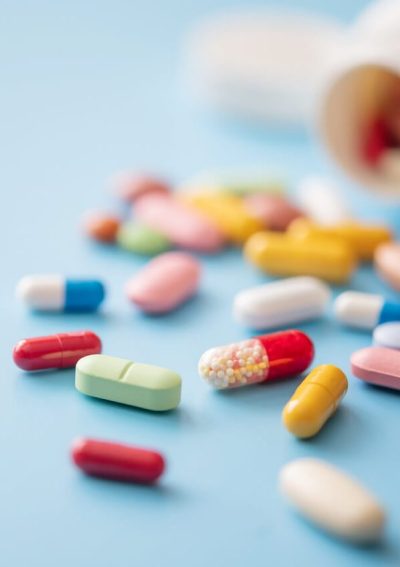Elmiron Alternatives
The prescription interstitial cystitis drug Elmiron can cause impaired vision, but Elmiron alternatives are available. Elmiron alternatives include pain management, physical therapy, bladder washes and surgery. Studies show not all Elmiron alternatives are equally effective.

Why Are People Looking for Elmiron Alternatives?
People are looking for a replacement for the prescription drug Elmiron because it can cause dangerous side effects impacting vision. Like any prescription drug, Elmiron has side effects but can also cause serious complications that have prompted Elmiron lawsuits.
Elmiron can increase instances of pigmentary maculopathy, a type of vision disorder that impacts the retina and can cause vision loss or damage. This Elmiron side effect typically occurs after at least three years of use but can occur with short-term use. Other short-term side effects include stomach upset or pain, diarrhea, headaches and hair loss.
Doctors use Elmiron to treat interstitial cystitis. This chronic inflammatory bladder condition can cause pressure and severe pain in the pelvic area.
Are There Natural Alternatives to Elmiron?
Natural alternatives to Elmiron can include making lifestyle changes. Quitting smoking, for example, reduces irritation in the bladder. Reducing stress can also impact IC symptoms. Although researchers do not completely understand the connection, IC symptom flare-ups tend to occur during periods of high stress.
Dietary changes may also help, such as avoiding caffeinated and carbonated drinks, spicy foods, tomatoes and citrus. Some people also note that avoiding artificial sweeteners helps alleviate IC symptoms. Drinking more water may also help.
Elmiron alternatives may not work the same way for every person and may need to be tried in combination for the best results. Some studies show that acupuncture can relieve IC symptoms. Some natural alternatives may come with their own risks. Supplements aren’t regulated as pharmaceuticals in the U.S. They’re regulated as food and not held to the same standards as medications. They can also interact with other medications you may be taking. Speak with a doctor before taking any supplement.
Physical Therapy and Exercise as Elmiron Alternatives
Physical therapy can help alleviate IC symptoms and may be an effective Elmiron alternative. Physical activity such as gentle walking or swimming may help reduce IC symptoms and stress. Stretching and pelvic floor physiotherapy that focuses on relaxing the pelvic floor muscles may reduce the pain of IC as well.
Pelvic floor physical therapy focuses on the muscles that support the bladder. Strengthening these may help build more muscle control and release trigger points deep within muscles that can cause pain.
Bladder and bowel training can be effective. Training the bladder to hold a greater volume of urine can reduce the stress associated with the frequent urge to urinate associated with IC. Bowel training can help reduce pressure on the bladder throughout the day. Doctors have found that having a bowel movement at the same time each day can reduce symptoms of IC in some individuals. Speak with your doctor about how best to achieve this.
Alternative Medications to Elmiron
Some over-the-counter and prescription Elmiron alternatives can effectively control symptoms of IC. Anti-inflammatory drugs such as ibuprofen, acetaminophen or aspirin may address IC symptoms as effectively as Elmiron. OTC antihistamines may also help reduce IC symptoms.
Some OTC medications can sometimes worsen IC symptoms or cause a flare-up. Speak with your doctor if you’re taking OTC medications and notice increased IC symptoms.
Antidepressants for Interstitial Cystitis
While there are multiple types of antidepressants, only tricyclic antidepressants have shown promise as an Elmiron alternative. Your doctor may prescribe it to relax the bladder, reducing IC symptoms.
- Amitriptyline
- Imipramine
- Nortriptyline
Research indicates these antidepressants may need to be prescribed at a high dose to be most effective. At a high dose, side effects may become more pronounced. Serious side effects include chest pain, dizziness or fainting, seizures, hallucinations and increased thoughts of suicide. Discuss these risks and benefits with your doctor. Report any side effects you may experience right away to your doctor.
Pain Medications for Interstitial Cystitis
Sometimes doctors suggest OTC pain medications such as Tylenol to reduce the inflammation and pain associated with IC. Nonsteroidal anti-inflammatories, including aspirin or Advil, are most often prescribed to reduce IC pain. Prescription pain medications may also be recommended.
- Acetaminophen
- Acetaminophen with Codeine
- Ibuprofen
- Naproxen
Make sure to discuss any changes in your IC symptoms with your doctor. In some cases, pain medications can trigger IC flare-ups. Your doctor will advise you if you need to reduce or stop taking pain medication and take a different approach to manage your IC.
Antihistamines and Singulair for Interstitial Cystitis
Antihistamines can reduce inflammation and pain in the bladder. Increased mast cell activity has been reported in patients affected by IC. This can cause the release of large amounts of histamine and hypersensitivity of the bladder. As such, histamine receptor inhibitors have been investigated as a possible therapeutic option in these patients.
Leukotriene, a naturally occurring chemical in the body, can also activate mast cells. Studies indicate the medication montelukast, which goes by the brand name Singulair, can reduce mast cell response, inflammation and pain.
- Hydroxyzine
- Loratidine
- Montelukast
Many patients don’t report noticeable symptom reduction with OTC antihistamines such as hydroxyzine or loratadine. Montelukast has been shown to be more effective, but can cause serious side effects, including pain and swelling in the eyes, cheekbones or anywhere on the body.
Some people report difficulty breathing, cough, swollen glands in the neck, trouble swallowing and pus in urine. Warning labels for Singulair indicate the possibility of psychological effects such as suicidal thoughts, anxiety and confusion.
Bladder Instillation and IC
Some people with IC have had success with bladder washes. During a bladder wash, a doctor guides a catheter into your bladder and slowly adds a liquid that reduces irritation and inflammation in the bladder walls.
This liquid may contain a topical anesthetic like lidocaine, a steroid or a chemical compound called dimethyl sulfoxide. In some cases, doctors use botulinum toxin A as a bladder wash, but studies show mixed efficacy.
Bladder washes with lidocaine have been shown to be as effective and may act as an Elmiron replacement. Dimethyl sulfoxide has also demonstrated efficacy when instilled every week for six weeks, but the treatment is painful and symptoms can relapse in as little as eight weeks.
Bladder Surgery as an Elmiron Alternative
Bladder augmentation or removal (cystectomy) are surgical options to reduce or eliminate IC symptoms. Bladder removal is a major invasive surgery and requires weeks of recovery. Nerve stimulation, or neuromodulation, is another procedure that is much less invasive and may be an effective Elmiron alternative.
- Bladder Augmentation (Cystoplasty): Surgery to expand the bladder, sometimes using intestinal tissue.
- Cystectomy With Ileal Conduit: Surgery to remove the bladder and urinary tract reconstruction that uses the ileum as an alternative pathway for urine to exit the body.
- Cystectomy With Orthotopic Neobladder: Surgery to remove and replace the bladder with an artificial bladder.
- Neuromodulation: Surgery to implant a nerve stimulator in the lower back to send signals to the nerves in the bladder, particularly those involved in urinary incontinence.
Cystectomy and cystoplasty are major surgeries and have serious risks, as with all surgeries. For this reason, surgery to treat IC is rarely considered, except in extreme cases. Neuromodulation is not often considered as it has mixed results in reducing IC symptoms and may not be effective for pain management.
13 Cited Research Articles
Consumernotice.org adheres to the highest ethical standards for content production and references only credible sources of information, including government reports, interviews with experts, highly regarded nonprofit organizations, peer-reviewed journals, court records and academic organizations. You can learn more about our dedication to relevance, accuracy and transparency by reading our editorial policy.
- MedlinePlus. (2023, February 15). Ibuprofen. Retrieved from https://medlineplus.gov/druginfo/meds/a682159.html
- MedlinePlus. (2022, July 15). Acetaminophen. Retrieved from https://medlineplus.gov/druginfo/meds/a681004.html
- Husney, A. & Wood, C.G. (2022, June 16). Bladder Augmentation: What to Expect at Home. Retrieved from https://myhealth.alberta.ca/Health/aftercareinformation/pages/conditions.aspx?hwid=ud1865
- Abat, D. et al. (2022, January 3). The effect of intravesical cocktail therapy combined with low-dose amitriptyline on primary bladder pain syndrome. Retrieved from https://link.springer.com/article/10.1007/s00192-021-05043-y
- Favaro, A., St. Philip, E. & Jones, A.M. (2021, February 21). Class-action lawsuit launched by Canadian women alleges bladder pain drug damaged their eyesight. Retrieved from https://www.ctvnews.ca/health/class-action-lawsuit-launched-by-canadian-women-alleges-bladder-pain-drug-damaged-their-eyesight-1.5318331?cache=yes
- MedlinePlus. (2021, December 15). Montelukast. Retrieved from https://medlineplus.gov/druginfo/meds/a600014.html
- Garzon, S. et al. (2020, April). An update on treatment options for interstitial cystitis. Retrieved from https://www.ncbi.nlm.nih.gov/pmc/articles/PMC7258371/
- National Institute of Diabetes and Digestive and Kidney Diseases. (2017, July). Eating, Diet & Nutrition for Cystitis. Retrieved from https://www.niddk.nih.gov/health-information/urologic-diseases/interstitial-cystitis-painful-bladder-syndrome/eating-diet-nutrition
- National Institute of Diabetes and Digestive and Kidney Diseases. (2017, July). Treatment for Interstitial Cystitis. Retrieved from https://www.niddk.nih.gov/health-information/urologic-diseases/interstitial-cystitis-painful-bladder-syndrome/treatment
- MedlinePlus. (2017, July 15). Amitriptyline. Retrieved from https://medlineplus.gov/druginfo/meds/a682388.html
- Lai, H.H. (2017, June 6). Management of Interstitial Cystitis/Bladder Pain Syndrome with Tricyclic Antidepressants. Retrieved from https://link.springer.com/chapter/10.1007/978-3-319-48464-8_8
- MedlinePlus. (2017, February 15). Hydroxyzine. Retrieved from https://medlineplus.gov/druginfo/meds/a682866.html
- National Center for Complementary and Integrative Health. (n.d.). Natural Doesn’t Necessarily Mean Safer, or Better. Retrieved from https://www.nccih.nih.gov/health/know-science/natural-doesnt-mean-better
Calling this number connects you with a Consumer Notice, LLC representative. We will direct you to one of our trusted legal partners for a free case review.
Consumer Notice, LLC's trusted legal partners support the organization's mission to keep people safe from dangerous drugs and medical devices. For more information, visit our partners page.
844-420-1914
